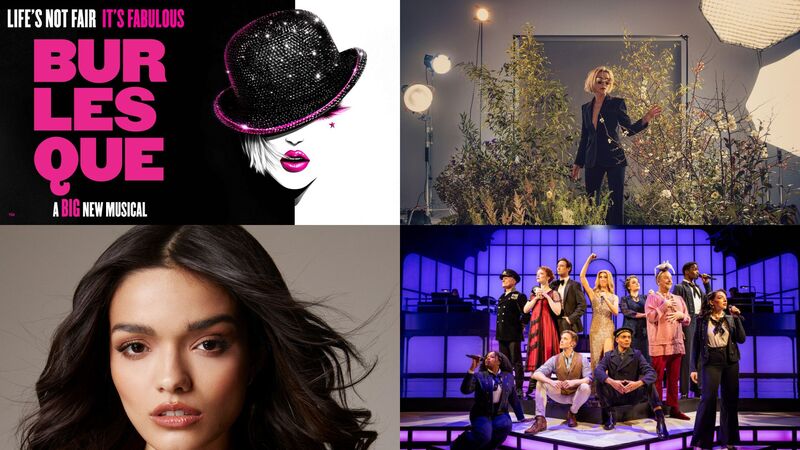When They Go Low by playwright Natalie Mitchell is a show which brings these discussions to the stage. Performed by CAPA Arts College, this play about everyday feminism and teenage sexuality is performed as part of the Connections Festival, NT’s nationwide youth festival.
Sarah (Annabelle Kaye) is publicly humiliated after intimate pictures of her at the weekend party are spread around the school she attends. Whilst Sarah wants to keep her head down and wait for it to all blow over, another student Louise (Carrogan Guest) is enraged by the sexism which enables slut-shaming, and takes it upon herself to rage a war against misogyny in the school corridors. Her actions threaten the fragile ego of popular schoolboy Scott (Owen Clayton) and his friends, and pretty soon a girls versus boys feud ensues.
The show is performed with real truth and feeling – a real testament to the CAPA Arts College cast. Carrogan Guest particularly shines as conscientious, morally conflicted Louise, struggling to find her voice as a woman, student and newbie activist. Jennifer Watts who plays the well-meaning Miss Reef, must also be commended for her fantastic comedic timing and infectious energy. In fact, the whole cast of sixteen work well together and bring the characters to life in an engaging manner. I also very much enjoyed how Mitchell's writing allows the characters to learn from their actions and to grow as the show unfolds.
There’s a real emphasis placed on powerful women throughout the show, and directors Katy James and Stacey Johnstone use punk rock music as a way to bring to our consciousness questions about power and challenging gender roles. For example, an awkward ‘girls only’ conversation with Miss Reef, turns into a rather fantastical St. Trinian-esque showdown, with the teenage girls screaming the lyrics to On Bondage. Up Yours ! by X-Ray Spex, a British punk rock band with an renowned female vocalist.
But that’s where my praise for the show must end. The show is highly problematic, not least of all in how it utilises voiceovers from Black women, such as Chimamanda Ngozi Adichie and Michelle Obama, whilst never once featuring a single Black performer onstage. It is appalling that in 2018, a show that (rightfully) cannot ignore the contributions of Black women towards the feminist movement, can still place sixteen white performers onstage, and only refer to Black people in passing - when it suits the political message of the piece. The piece is not inclusive (and the one line about ‘intersectional feminism’ does more to highlight the inequality present, rather than diminish it). It reads rather like an act of tokenism, to have some voiceovers from Adichie, and the occasional picture of a Black woman onstage. As a show which claims to be about modern day feminism, and features so many young people, I would have liked it to be much more progressive. Unfortunately the curation of the piece left a bitter taste in my mouth.
Many characters are also reduced to mere mouth-pieces for the show’s political message. And to this end, the dialogue becomes not only repetitive, but also preachy. Yet Sarah (the girl whose pictures were circulated in the first place) is not really included in the conversation. Yes, she speaks up towards the end, but for the most part, Sarah is a scorned individual whose shame about the whole incident means she remains silent for the majority of the play, while everyone else speaks about (and for) her.
The show also adds to the problems it is trying to resolve around gender stereotypes. For example, only male characters play the roles of janitors, and one schoolgirl who is apparently not conventionally attractive, is consistently referred to as ‘Smelly Anna’ but never seen onstage. This would be fine if her presentation were subverted in any way, but references to Smelly Anna are never really interrogated or resolved.
There’s also a message which seems to suggest that boys can only care about feminism once they understand how it affects their lives and not that of their female counterparts. And Louise is branded as an angry feminist who must calm down and ensure that her arguments appeal more to men.
I appreciate that this piece is addressing things which must be discussed, and shows how sexism is experienced amongst people of all ages. My above contentions are a pity considering the strong performances by the cast, which I would not like to detract from. This is a piece with potential to be reworked in a more reflective and inclusive manner.

 Anger over the policing of women’s bodies, alongside topical issues such as slut-shaming, social media bullying and what it means to be a feminist, are all conversations that are (rightfully) at the forefront of contemporary discussion.
Anger over the policing of women’s bodies, alongside topical issues such as slut-shaming, social media bullying and what it means to be a feminist, are all conversations that are (rightfully) at the forefront of contemporary discussion.


 Set in Dungeness, a remote part of the UK, a small group of teenagers meet in a safe house for LGBT+ youth. Dungeness by Chris Thompson is about commemoration, visibility and identity. It is performed by PACE Youth Theatre, and is performed at the closing of Connections Festival 2018 (and, rather appropriately, Pride Month 2018).
Set in Dungeness, a remote part of the UK, a small group of teenagers meet in a safe house for LGBT+ youth. Dungeness by Chris Thompson is about commemoration, visibility and identity. It is performed by PACE Youth Theatre, and is performed at the closing of Connections Festival 2018 (and, rather appropriately, Pride Month 2018).